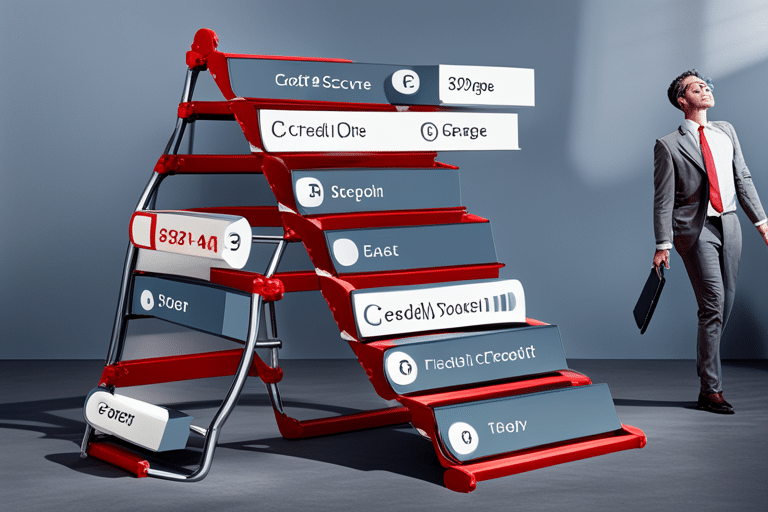Hey there, credit score explorer! Ready to embark on a journey to demystify the elusive world of credit score ranges? Well, you’ve come to the right place.
In this article, we’ll unravel the secrets behind what makes a good credit score and how it impacts your financial life. So grab a cup of coffee, get cozy, and let’s dive into the realm of credit scores together.
Trust us, by the end, you’ll be a master in no time!
Key Takeaways
- Credit score ranges from 300 to 850, with 300 being the lowest and 850 being the highest.
- Factors like payment history, credit utilization ratio, length of credit history, new accounts, types of credit, and recent inquiries impact your credit score.
- A good credit score opens up better interest rates, loan options, and makes it easier to rent an apartment or get a cell phone plan.
- High credit scores have benefits like lower interest rates, saving money in the long run, higher chances of approval for rental applications, lower insurance premiums, and more negotiating power when buying a car or home.
Understanding Credit Score Ranges

Understanding credit score ranges is important when determining what is considered a good credit score. It’s like trying to solve a puzzle where the pieces keep changing shape and color. But fear not, my friend! I am here to guide you through this maze of numbers and help you understand what makes your creditworthiness tick.
So, what are these elusive credit score ranges? Well, they range from 300 to 850, with 300 being the lowest and 850 being the highest. It’s like a rollercoaster ride where you want to be at the top, riding high on that perfect credit score wave.
Now, let’s talk about the factors affecting your credit scores. These can include payment history (are you paying your bills on time?), amounts owed (how much debt do you have?), length of credit history (how long have you been borrowing money?), types of credit used (do you have a mix of installment loans and revolving accounts?), and new credit (have you recently applied for multiple lines of credit?).
Understanding these factors will give you insight into how lenders evaluate your creditworthiness. Think of it as cracking the code to financial success. The higher your score, the more likely it is that lenders will view you as trustworthy and responsible.
Factors Impacting Your Credit Score

Factors like payment history, credit utilization, and length of credit history can all impact your credit score. It’s like a magical potion that lenders use to determine whether you’re worthy of their trust. Think of it as a secret recipe with ingredients that need to be just right. Let’s dive into the factors affecting your creditworthiness and understand the mystical credit score calculation process.
First up is payment history – the holy grail of credit scores. Your ability to pay your bills on time is crucial in maintaining a healthy score. Late payments are like black marks on your record, so make sure you always meet those due dates.
Next, we have credit utilization – the ratio of how much you owe compared to your available credit limit. Keep this number low because using too much of your available credit can raise red flags for lenders.
Now let’s talk about length of credit history – how long you’ve been playing the game. The longer, the better! It shows that you have experience handling different types of credits responsibly over time.
But wait, there’s more! Other factors include new accounts (don’t go crazy opening multiple accounts at once), types of credits (mix it up with different types), and recent inquiries (too many can hurt). These elements all play their part in the mysterious world of calculating your credit score.
The Importance of a Good Credit Score

So, you’ve been diligently working on improving your credit score, but do you know why it’s so important?
Well, let me tell you! Having a good credit score opens up a world of possibilities for you.
Not only will you have access to better interest rates and loan options, but it can also make renting an apartment or getting a cell phone plan a breeze.
Trust me, your high score is going to pay off in more ways than one!
Benefits of High Scores
Having a high credit score can lead to lower interest rates on loans and credit cards, allowing you to save money in the long run. Imagine the benefits of having a great credit score! It’s like having a secret superpower that opens up a world of financial advantages.
Here are some amazing perks that come with maintaining good credit:
- Access to better loan terms
- Higher chances of approval for rental applications
- Lower insurance premiums
- More negotiating power when buying a car or home
- Ability to qualify for premium rewards credit cards
With these incredible benefits at your fingertips, it’s clear why having good credit is so important. But what impact does your credit score have on your overall financial options? Let’s explore further in the next section.
Impact on Financial Options
Your credit score directly affects the range of financial options available to you. It’s not just a number; it has the power to open doors or slam them shut.
Don’t let credit score myths hold you back from achieving your financial goals. Contrary to popular belief, having a good credit score doesn’t mean you can magically buy anything you want or that it guarantees approval for loans and credit cards. However, a higher credit score does give you access to better interest rates and more favorable terms, which can save you money in the long run.
Credit Score Ranges Explained

So you’ve heard people talking about credit scores, and maybe it’s got you a little curious. Well, let me break it down for you.
In this discussion, we’ll explore what exactly a credit score is, how it can impact your chances of getting approved for a loan, and some helpful tips on improving your creditworthiness.
Meaning of Credit Score
The meaning of a credit score can vary depending on the lending institution. It is a numerical representation of your creditworthiness, which is used by lenders to determine your ability to repay loans and manage credit responsibly. Understanding creditworthiness and how credit scores are calculated is crucial for maintaining financial health. Here are five key points to consider:
- Your credit score reflects your past borrowing behavior and financial habits.
- A higher credit score indicates better creditworthiness and makes it easier to qualify for loans with favorable terms.
- Late payments, high debt levels, and derogatory marks can negatively impact your credit score.
- Regularly monitoring your credit report helps you stay aware of any errors or fraudulent activity that could affect your score.
- Improving your credit score takes time and requires responsible financial management.
Impact on Loan Approval
To increase your chances of loan approval, it’s important to understand how your credit score impacts lenders’ decisions. Your credit score is like a report card for your financial responsibility, and lenders use it to assess the risk of lending you money. Let’s take a look at how different credit scores can affect your loan application process and the credit score requirements set by lenders.
| Credit Score Range | Impact on Loan Approval |
|---|---|
| Excellent (800-850) | Most likely to be approved with favorable terms |
| Good (670-799) | Likely to be approved with reasonable terms |
| Fair (580-669) | May face challenges in approval with less favorable terms |
As you can see, having a higher credit score greatly improves your chances of getting approved for a loan. However, even if you fall into the fair range, don’t worry! There are still options available to you. In the next section, we’ll discuss some tips on improving your creditworthiness and increasing your chances of loan approval. So let’s dive in!
Improving Creditworthiness Tips
Check out some helpful tips for improving your creditworthiness and increasing your chances of loan approval:
-
Pay Your Bills on Time: Timely payments show lenders that you are responsible and trustworthy.
-
Keep Credit Utilization Low: Aim to use only a small portion of your available credit to demonstrate financial stability.
-
Diversify Your Credit Mix: Having a mix of different types of credit, such as loans and credit cards, can positively impact your score.
-
Monitor Your Credit Report Regularly: Stay on top of any errors or fraudulent activity by checking your report regularly.
-
Limit New Credit Applications: Applying for too much credit in a short period can raise red flags for lenders.
Improving your creditworthiness is like building a solid foundation for your financial future. By following these simple but effective strategies, you’ll be well on your way to mastering the art of credit score management.
How to Check Your Credit Score

You can easily find out your credit score by using online services. It’s like having a secret decoder ring for your financial life. Knowing your credit score is not just some nerdy number; it’s actually pretty important. Think of it as the golden ticket to financial opportunities.
So, let’s dive into the world of checking credit scores and uncover why they hold so much importance.
First things first, what exactly is a credit score? Well, my friend, it’s a numerical representation of your creditworthiness. It tells lenders how reliable you are when it comes to paying back borrowed money. And trust me, lenders take this stuff seriously! They use your credit score to determine whether or not to give you that dream car loan or mortgage.
Now, imagine this scenario: You’re strolling down the street on a sunny day, minding your own business when suddenly… BAM! You stumble upon an unbelievable deal on a fancy new gadget that you’ve been eyeing for months. Your heart races with excitement as you reach for your wallet… but wait! Without knowing your credit score, there’s no way to know if you’ll get approved for that sweet financing deal.
That’s where checking your credit score comes in handy. With just a few clicks and taps on your smartphone or computer, you can unveil the three-digit magic number behind those closed doors of financial institutions. Armed with this knowledge, you’ll have the power to make informed decisions about borrowing money and seizing those amazing opportunities that come knocking at your door.
Tips for Improving Your Credit Score

When it comes to improving your credit score, there are a few simple strategies that can make a big difference. Building credit may seem like a daunting task, but fear not! With these tips, you’ll be well on your way to boosting your credit score and achieving financial mastery.
Here are five key steps to improve your credit score:
-
Pay your bills on time: Late payments can have a negative impact on your credit score. Set up automatic payments or reminders to ensure you never miss a due date.
-
Reduce your credit utilization: Credit utilization refers to the amount of available credit you’re using. Aim to keep this ratio below 30% by paying down balances or requesting higher credit limits.
-
Diversify your debt: Having different types of debt, such as a mix of installment loans and revolving accounts like credit cards, can demonstrate responsible borrowing habits and positively affect your score.
-
Keep old accounts open: Length of credit history is important for building good credit. Instead of closing old accounts, keep them open and use them occasionally to maintain activity.
-
Regularly review your credit reports: Monitoring your reports allows you to catch errors or fraudulent activity that could negatively impact your score. Report any inaccuracies immediately to the respective bureaus.
How Lenders Use Credit Scores

So, you’ve got your credit score all figured out and now you’re ready to dive into the world of lenders. Well, buckle up because it’s about to get real.
In this discussion, we’ll be tackling the mysterious criteria that lenders use when evaluating your credit score. We’ll also be exploring the impact those scores can have on your financial life.
Additionally, we’ll be uncovering tips for improving your creditworthiness through those magical numbers.
Get ready for a wild ride!
Lenders’ Credit Score Criteria
To determine your eligibility for a loan, lenders typically have specific credit score criteria that they use. These criteria are based on their risk assessment and the impact of your credit score on their decision-making process.
Here are five things you should know about lenders’ credit score criteria:
- Your credit score is one of the main factors that lenders consider when evaluating your loan application.
- Lenders may have different minimum credit score requirements for different types of loans.
- A higher credit score generally increases your chances of getting approved for a loan with favorable terms.
- Some lenders also take other factors into account, such as income, employment history, and debt-to-income ratio.
- It’s important to regularly monitor and maintain a good credit score to improve your chances of getting approved for future loans.
Understanding lenders’ credit score criteria can help you better navigate the loan application process and increase your chances of securing financing.
Now let’s explore the impact that credit scores can have on various aspects of your financial life.
Impact of Credit Scores
Understanding the impact credit scores have on your financial life can help you make informed decisions that improve your overall financial well-being. Your credit score is like a magic number that lenders use to determine how risky it is to lend you money. It’s not just about whether you get approved or denied for a loan, it also affects the interest rates you’re offered. Let’s break it down with a handy table:
| Credit Score Range | Implications | Impact on Interest Rates |
|---|---|---|
| Excellent (800+) | You’re golden! Lenders love you and offer the best rates. | Lowest interest rates available |
| Good (670-799) | Still great! Most lenders will approve you and give reasonable rates. | Good interest rates, but not the absolute best |
| Fair (580-669) | Getting riskier… Some lenders may hesitate, and higher interest rates are likely. | Higher interest rates than those with good scores |
Improving Creditworthiness Through Scores
So, you’ve learned about the impact of credit scores. Now it’s time to dive into the exciting world of improving your creditworthiness! Boosting your credit score isn’t rocket science, but it does require some know-how. Here are a few strategies to help you on your journey:
- Pay your bills on time: This simple habit can have a big impact on your credit score.
- Reduce your debt: Lowering your debt-to-income ratio shows lenders that you’re responsible with money.
- Keep old accounts open: Length of credit history matters, so hold onto those old cards (even if they’re gathering dust).
- Diversify your credit mix: Having a healthy mix of different types of credit (like loans and credit cards) can improve your score.
- Regularly check your credit report: Spotting errors and addressing them promptly is crucial for maintaining a good score.
Common Misconceptions About Credit Scores

Contrary to popular belief, having a high credit limit does not automatically guarantee a good credit score. It’s time to debunk some common misconceptions and put those credit score myths to rest.
So, you think that just because your credit card company has generously offered you a sky-high spending limit, your credit score must be soaring as well? Think again!
One of the biggest misconceptions is that having a high credit limit means you’re financially responsible. Sure, it may seem like you have the green light to splurge on that designer handbag or luxury vacation, but remember this: it’s not about how much money you can spend; it’s about how well you manage it.
Another myth is that carrying a balance on your credit card will boost your score. False! Carrying a balance not only racks up interest charges but also shows lenders that you may struggle with debt repayment. Paying off your balances in full each month demonstrates good financial habits and boosts your creditworthiness.
Now that we’ve cleared up these misconceptions, let’s dive into understanding the different ranges of credit scores for various loan types. Because while having a ‘good’ score is important overall, different loans have different requirements when it comes to what is considered ‘good.’ So let’s explore how each range affects your ability to secure different kinds of loans and take control of your financial future!
Credit Score Ranges for Different Loan Types

If you’re looking to secure different types of loans, it’s important to be aware of how your credit score range can impact your eligibility. Your credit score is like a report card for your financial responsibility. It tells lenders how likely you are to repay your debts on time. So, let’s dive into the different credit score ranges for mortgage and auto loans!
Here are some things you should know:
-
Excellent Credit (750+): Congratulations! Lenders will be falling over themselves to offer you the best interest rates and loan terms. You’ll feel like a financial superstar!
-
Good Credit (700-749): You’re in good shape! While not as high as excellent, this range still puts you in a favorable position. Expect decent interest rates and loan options.
-
Fair Credit (650-699): Not too shabby! You may face slightly higher interest rates, but lenders will still consider you for loans.
-
Poor Credit (550-649): Uh oh! This range might make lenders a bit wary. You may need to work harder to find lenders willing to take a chance on you.
-
Bad Credit (<550): Yikes! This range could seriously limit your loan options. It’s best to focus on improving your credit before applying for major loans.
Remember, these credit score ranges aren’t set in stone. Different lenders may have their own criteria and weight different factors more heavily than others when considering loan applications.
Maintaining a Good Credit Score Over Time

To maintain a good credit score over time, you should consistently make your payments on time and keep your credit utilization low. It may sound simple enough, but life often throws unexpected curveballs our way. Don’t worry though, because I’ve got some strategies to help you navigate the tricky waters of maintaining creditworthiness. So grab your pen and paper (or virtual note-taking app) and get ready to take some notes!
First things first, let’s talk about making those payments on time. We all know that life can get busy and sometimes bills slip through the cracks. But if you want to keep that credit score shining like a diamond, it’s crucial to stay on top of your payment due dates. Set reminders on your phone or use online banking tools to automate the process. Trust me, future you will thank present you for being so organized.
Next up is keeping your credit utilization low. This basically means not maxing out those shiny plastic cards in your wallet. Aim to use no more than 30% of your available credit at any given time. Think of it as a balancing act – too much usage can send red flags to lenders, while too little usage might make them question whether you’re responsible enough with credit.
Now let’s dive into the strategies for improving your credit score:
| Strategies for Credit Score Improvement |
|---|
| Paying bills on time |
| Keeping credit utilization low |
| Regularly checking credit reports |
| Diversifying types of accounts |
| Avoiding opening unnecessary accounts |
Frequently Asked Questions
What Is the Average Credit Score in the United States?
In the United States, the average credit score is a number that represents your creditworthiness. Many factors contribute to this score, so it’s important to understand how they can affect you.
Can My Credit Score Be Negatively Impacted by Someone Else’s Actions?
If someone you’re connected to financially messes up, like with joint accounts or cosigning a loan, it can totally tank your credit score. So be careful who you trust with your money!
Are There Any Penalties for Checking My Own Credit Score?
Checking your credit score yourself can be like looking in a mirror – it gives you a clear picture of your financial health. Pros include catching errors, but cons are that frequent checks may temporarily lower your score.
How Long Does It Take for a Late Payment to Affect My Credit Score?
Late payments can impact your credit score, but the time it takes for them to affect it can vary. Factors like frequency and severity of late payments, as well as overall credit history, play a role.
Can I Have a Good Credit Score Without a Credit History?
You may think it’s impossible, but you can actually build credit and have a good credit score without a credit history. Factors like on-time payments, low credit utilization, and diversified accounts play a big role in boosting your score. So don’t fret!
Conclusion
Congratulations! You’ve reached the end of our credit score journey.
Now, here’s a fascinating statistic to leave you pondering: Did you know that only 21% of Americans have a credit score above 800?
That means if you’re part of this elite group, give yourself a pat on the back!
But don’t fret if your score isn’t quite there yet. Remember, building and maintaining a good credit score takes time and effort.
So keep those payments timely, watch your credit utilization, and soon enough, you’ll be soaring high in the credit score charts!

